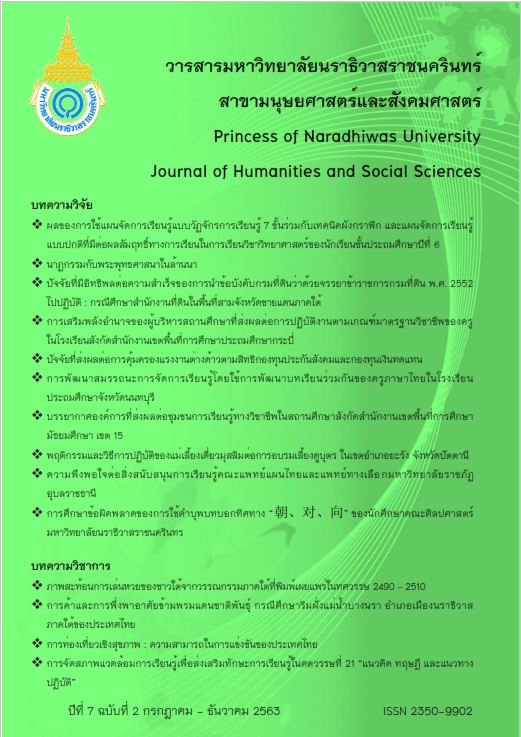The satisfaction on supportive learning materials of the Faculty of Thai Traditional and Alternative Medicine, Ubon Ratchathani Rajabhat University
Main Article Content
Abstract
This research aimed 1) to study satisfaction on supportive learning materials of the Faculty of Thai Traditional and Alternative Medicine, Ubon Ratchathani Rajabhat University in academic year of 2018 (B.E. 2561) and 2) to compare satisfaction on supportive learning materials, classified by gender and status within the faculty. The samples were 142 personals, selected with multi-stage sampling technique and its size based on Taro Yamane's formula. The research tool was a questionnaire with the reliability 0.88. To analyze data, basic statistics such as percentage, mean and standard deviation were used as well as content analysis.
The results showed that the overall satisfaction of learning supports in the academic year of 2018 was at a moderate level. It was found that the adequacy of desks and chairs in the classroom and laboratory received the highest satisfaction of all learning supports. The lowest satisfaction among all supports was the adequacy of computers with internet but still was at a moderate level. The comparison of satisfaction with learning supports classified by gender was not different between males and females. Similarly, the satisfaction of learning supports classified by status within the faculty was not different. Last, there were suggestions for the faculty to provide additional textbooks in the library, to expand internet areas, to improve the system to be more stable and to provide rooms or space for discussion or counselling between teachers and students.
Article Details
References
ไชยมนู กุนอก. (2561). ความคิดเห็นของนิสิตวิทยาลัยการเมืองการปกครองต่อสิ่งสนับสนุนการเรียนรู้ของวิทยาลัยการเมืองการปกครอง มหาวิทยาลัยมหาสารคาม. วารสารการเมืองการปกครอง, 8(2), 171 – 185.
บุญชม ศรีสะอาด. (2556). การวิจัยเบื้องต้น. พิมพ์ครั้งที่ 9. กรุงเทพฯ: โรงพิมพ์สุวีริยาสาส์น.
ประสพชัย พสุนนท์. (2557). ความเชื่อมั่นของแบบสอบถามในการวิจัยเชิงปริมาณ. วารสารปาริชาต มหาวิทยาลัยทักษิณ, 27(1), 158 – 159.
พรรณี ลีกิจวัฒนะ. (2558). วิธีวิจัยทางการศึกษา. พิมพ์ครั้งที่ 10. กรุงเทพฯ : คณะครุศาสตร์อุตสาหกรรม สถาบันเทคโนโลยีพระจอมเกล้าเจ้าคุณทหารลาดกระบัง.
วรพจน์ วงศ์กิจรุ่งเรือง และอธิป จิตตฤกษ์. (2556). ทักษะแห่งอนาคตใหม่: การศึกษาเพื่อศตวรรษที่ 21 (พิมพ์ครั้งที่ 2 ฉบับปรับปรุง). กรุงเทพฯ: โอเพ่นเวิลด์ส.
วิจารณ์ พานิช. (2555). วิถีสร้างการเรียนรู้เพื่อศิษย์ในศตวรรษที่ 21. กรุงเทพฯ: มูลนิธิสดศรีสฤษดิ์วงศ์.
วิรุธน์ บัวงาม สุภัทรา กลางประพันธ์ และกรรณิการ์ พุ่มทอง. (2557). สภาพแวดล้อมที่เกี่ยวข้องกับการจัดการศึกษาของคณะแพทย์แผนไทยและแพทย์ทางเลือกในทัศนะของนักศึกษาแพทย์แผนไทย. วารสารศรีวนาลัยวิจัย มหาวิทยาลัยราชภัฏอุบลราชธานี, 4(7), 28.
สำนักงานคณะกรรมการการอุดมศึกษา. (2558). คู่มือการประกันคุณภาพการศึกษา ภายในระดับอุดมศึกษา พ.ศ. 2557. กรุงเทพฯ: ภาพพิมพ์.
สำนักส่งเสริมวิชาการและงานทะเบียน. (2561). ข้อมูลสถิตินักศึกษา มหาวิทยาลัยราชภัฏอุบลราชธานี ประจำภาคเรียนที่ 2 ปีการศึกษา 2561. (ออนไลน์). สืบค้นเมื่อวันที่ 28 เมษายน 2562 จาก http://www.apr.ubru.ac.th/index.php/
สีอำพัน อยู่คงคร้าม จำรูญ จิรัฏฐิติ และดวงพร แหล่งหล้า. (ม.ป.ป.). ความพึงพอใจต่อสิ่งสนับสนุนการเรียนรู้ของนักศึกษาคณะสาธารณสุขศาสตร์ มหาวิทยาลัยกรุงเทพธนบุรี. บทคัดย่อ.
สุณิสา สำเร็จดี ศรินยา พลสิงห์ชาญ และกิตติยา อาษากิจ. (2559). ความพึงพอใจของนักศึกษาต่อคุณภาพการบริการสิ่งสนับสนุนการเรียนรู้ วิทยาลัยพยาบาลบรมราชชนนีสุรินทร์. ราชาวดีสาร วิทยาลัยพยาบาลบรมราชชนนีสุรินทร์, 6(2), 21 – 32.
Douglas J, Douglas A, & Barnes B. (2006). Measuring student satisfaction at a UK university. Quality assurance in education. 2006 Jul 1; 14(3): 251-67.
Partnership for 21th Century Skills. (2015). P21 framework definitions. Retrieved January 14, 2020. From http://www.p21.org/storage/documents/docs/P21_Framework_Definitions_New_ Logo_2015.pdf.


